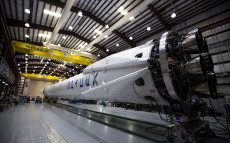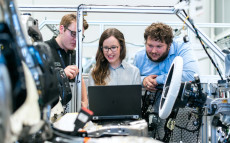- pathfindersAI
- Job Profile
Fuel Cell Engineers
Summary
Fuel Cell Engineers: Pioneers of Sustainable Energy
What They Do
Fuel Cell Engineers are at the forefront of the renewable energy revolution, pioneering the development and optimization of fuel cell technology. These professionals harness chemical reactions to generate clean energy, reducing our reliance on fossil fuels and mitigating environmental impacts. Their work spans various industries, including automotive, aerospace, and stationary power generation. With a deep understanding of electrochemical processes, Fuel Cell Engineers innovate and improve fuel cell systems, making them more efficient, cost-effective, and commercially viable.
Job Responsibilities
Fuel Cell Engineers have a diverse array of responsibilities that encompass research, development, testing, and implementation. They are tasked with designing and developing new fuel cell systems or enhancing existing ones. This involves creating prototypes, conducting simulations, and performing hands-on testing to assess performance and durability. Fuel Cell Engineers also work collaboratively with other scientists and engineers to optimize fuel cell components, such as membranes, electrodes, and catalysts. They analyze data to troubleshoot and refine fuel cells, ensuring they meet industry standards and regulatory requirements. Additionally, these engineers often prepare technical reports, present their findings at conferences, and contribute to scholarly publications.
Essential Skills
The role of a Fuel Cell Engineer requires a blend of technical proficiency, analytical thinking, and innovative problem-solving skills. A strong foundation in chemistry, materials science, and thermodynamics is crucial, as these fields underpin the principles of fuel cell operation. Proficiency in computer-aided design (CAD) software and computational fluid dynamics (CFD) tools is also essential for simulating and optimizing fuel cell systems. Effective communication and teamwork skills are vital, enabling Fuel Cell Engineers to collaborate with multidisciplinary teams and convey complex technical concepts to non-specialists. Moreover, critical thinking and attention to detail are paramount for diagnosing issues and implementing successful solutions.
Educational Pathways
Aspiring Fuel Cell Engineers typically begin their educational journey with a bachelor's degree in chemical engineering, mechanical engineering, or a related field. Undergraduate coursework should include subjects such as chemistry, physics, thermodynamics, and materials science. Gaining practical experience through internships or cooperative education programs is highly advantageous. Many Fuel Cell Engineers pursue advanced degrees, such as a Master’s or Ph.D., to deepen their expertise and engage in cutting-edge research. Specializing in fields like electrochemistry or renewable energy during graduate studies can provide a competitive edge. Additionally, professional certifications, such as those offered by the Electrochemical Society, can enhance credibility and career opportunities.
Career Prospects
The demand for Fuel Cell Engineers is poised to grow as the world shifts towards sustainable energy solutions. These engineers can find opportunities in various sectors, including automotive companies developing fuel cell electric vehicles, aerospace firms exploring alternative propulsion methods, and energy companies investing in clean power generation. Government agencies and research institutions also offer roles for Fuel Cell Engineers to contribute to policy development and advanced research projects. The interdisciplinary nature of fuel cell technology means that these engineers can engage in diverse and impactful work, with the potential for career advancement in roles such as project manager, research scientist, or technical director.
Conclusion
Fuel Cell Engineers play a critical role in addressing the global need for sustainable and clean energy solutions. Their expertise in designing, testing, and optimizing fuel cell systems makes them invaluable to industries seeking to reduce carbon footprints and innovate for the future. With a robust educational background, a diverse skill set, and a commitment to continuous learning, Fuel Cell Engineers are well-equipped to contribute to the advancement of renewable energy technologies and the realization of a greener planet. Pursuing a career in this dynamic field offers not only a pathway to professional growth but also the opportunity to make a meaningful impact on society and the environment.
Video
Compensation
| State | Median Salary | Median Hourly | Positions |
|---|---|---|---|
| AL | 97,050 | 46.66 | 5,280 |
| AK | 101,960 | 49.02 | 420 |
| AZ | 99,650 | 47.91 | 5,360 |
| AR | 74,840 | 35.98 | 1,000 |
| CA | 122,550 | 58.92 | 27,420 |
| CO | 101,700 | 48.89 | 7,100 |
| CT | 101,700 | 48.90 | 4,360 |
| DE | 102,070 | 49.07 | 580 |
| DC | 124,160 | 59.69 | 520 |
| FL | 92,810 | 44.62 | 8,520 |
| GA | 84,080 | 40.43 | 5,600 |
| HI | 97,140 | 46.70 | 530 |
| ID | 81,280 | 39.08 | 1,150 |
| IL | 99,420 | 47.80 | 10,260 |
| IN | 94,930 | 45.64 | 9,170 |
| IA | 97,120 | 46.69 | 5,340 |
| KS | 83,260 | 40.03 | 2,720 |
| KY | 95,820 | 46.07 | 2,970 |
| LA | 109,200 | 52.50 | 1,270 |
| ME | 98,690 | 47.45 | 850 |
| MD | 106,280 | 51.10 | 5,600 |
| MA | 108,490 | 52.16 | 9,140 |
| MI | 98,760 | 47.48 | 32,580 |
| MN | 94,520 | 45.44 | 5,660 |
| MS | 84,390 | 40.57 | 1,110 |
| MO | 82,700 | 39.76 | 3,360 |
| MT | 83,050 | 39.93 | 470 |
| NE | 86,240 | 41.46 | 880 |
| NV | 82,950 | 39.88 | 950 |
| NH | 99,990 | 48.07 | 2,950 |
| NJ | 102,370 | 49.22 | 4,830 |
| NM | 133,660 | 64.26 | 1,870 |
| NY | 97,410 | 46.83 | 8,190 |
| NC | 95,490 | 45.91 | 7,500 |
| ND | 84,690 | 40.72 | 730 |
| OH | 92,360 | 44.41 | 15,160 |
| OK | 94,860 | 45.61 | 2,130 |
| OR | 100,990 | 48.55 | 3,140 |
| PA | 97,340 | 46.80 | 19,060 |
| RI | 100,190 | 48.17 | 1,510 |
| SC | 95,880 | 46.10 | 4,530 |
| SD | 84,050 | 40.41 | 690 |
| TN | 97,770 | 47.01 | 2,400 |
| TX | 103,190 | 49.61 | 19,630 |
| UT | 93,720 | 45.06 | 3,450 |
| VT | 97,970 | 47.10 | 640 |
| VA | 101,900 | 48.99 | 6,150 |
| WA | 104,510 | 50.25 | 7,190 |
| WV | 96,300 | 46.30 | 720 |
| WI | 86,200 | 41.44 | 8,400 |
| WY | 105,860 | 50.90 | 250 |
Similar Occupations
In this area you will find other occupations that are close to the one you were viewing in tasks, knowledge and work environment. If the primary job profile you are viewing isn't quite to your liking, take a look around and see what else is available.
Basic and Premium Accounts have more alternative occupations available than the Free account.

Aerospace Engineers - 17-2011.00
Aerospace Engineers design, develop, and test aircraft, spacecraft, and related systems and equipment to ensure they meet safety, performance, and regulatory standards. They work on a range of areas including structural design, navigation systems, propulsion, and aerodynamics to advance aviation and space exploration technology.
-
$130,720/yr
Median Pay -
66,660
Number of Jobs

Automotive Engineers - 17-2141.02
Automotive Engineers design, develop, and improve vehicles and their subsystems, ensuring they meet performance, safety, and efficiency standards. They work on tasks ranging from creating prototypes to conducting rigorous testing and collaborating with multidisciplinary teams to bring innovative automotive solutions to market.
-
$99,510/yr
Median Pay -
281,290
Number of Jobs